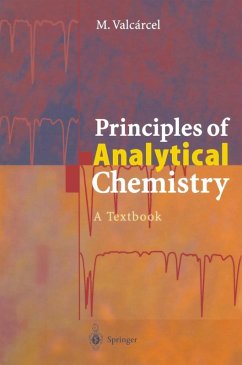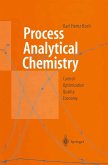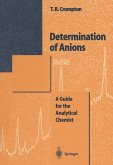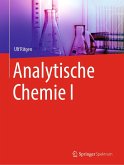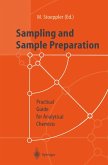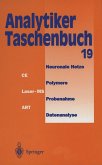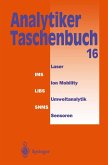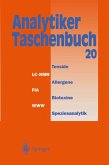40,95 €
40,95 €
inkl. MwSt.
Sofort per Download lieferbar

20 °P sammeln
40,95 €
Als Download kaufen

40,95 €
inkl. MwSt.
Sofort per Download lieferbar

20 °P sammeln
Jetzt verschenken
Alle Infos zum eBook verschenken
40,95 €
inkl. MwSt.
Sofort per Download lieferbar
Alle Infos zum eBook verschenken

20 °P sammeln
- Format: PDF
- Merkliste
- Auf die Merkliste
- Bewerten Bewerten
- Teilen
- Produkt teilen
- Produkterinnerung
- Produkterinnerung

Bitte loggen Sie sich zunächst in Ihr Kundenkonto ein oder registrieren Sie sich bei
bücher.de, um das eBook-Abo tolino select nutzen zu können.
Hier können Sie sich einloggen
Hier können Sie sich einloggen
Sie sind bereits eingeloggt. Klicken Sie auf 2. tolino select Abo, um fortzufahren.

Bitte loggen Sie sich zunächst in Ihr Kundenkonto ein oder registrieren Sie sich bei bücher.de, um das eBook-Abo tolino select nutzen zu können.
This new textbook aims at giving the student a taste of what Analytical Chemistry essentially is. Using keywords of modern Analytical Chemistry, it constructs an innovative teaching message accessible to the beginner. Practical exercises, questions and seminars are used as vehicles for expounding a large number of examples in order to clarify and consolidate the text and facilitate its comprehension.
- Geräte: PC
- ohne Kopierschutz
- eBook Hilfe
- Größe: 47.85MB
Andere Kunden interessierten sich auch für
![Process Analytical Chemistry (eBook, PDF) Process Analytical Chemistry (eBook, PDF)]() Karl H. KochProcess Analytical Chemistry (eBook, PDF)160,95 €
Karl H. KochProcess Analytical Chemistry (eBook, PDF)160,95 €![Determination of Anions (eBook, PDF) Determination of Anions (eBook, PDF)]() Thomas R. CromptonDetermination of Anions (eBook, PDF)232,95 €
Thomas R. CromptonDetermination of Anions (eBook, PDF)232,95 €![Analytische Chemie I (eBook, PDF) Analytische Chemie I (eBook, PDF)]() Ulf RitgenAnalytische Chemie I (eBook, PDF)34,99 €
Ulf RitgenAnalytische Chemie I (eBook, PDF)34,99 €![Sampling and Sample Preparation (eBook, PDF) Sampling and Sample Preparation (eBook, PDF)]() Sampling and Sample Preparation (eBook, PDF)72,95 €
Sampling and Sample Preparation (eBook, PDF)72,95 €![Analytiker-Taschenbuch (eBook, PDF) Analytiker-Taschenbuch (eBook, PDF)]() Helmut GünzlerAnalytiker-Taschenbuch (eBook, PDF)46,99 €
Helmut GünzlerAnalytiker-Taschenbuch (eBook, PDF)46,99 €![Analytiker-Taschenbuch (eBook, PDF) Analytiker-Taschenbuch (eBook, PDF)]() Helmut GünzlerAnalytiker-Taschenbuch (eBook, PDF)46,99 €
Helmut GünzlerAnalytiker-Taschenbuch (eBook, PDF)46,99 €![Analytiker-Taschenbuch (eBook, PDF) Analytiker-Taschenbuch (eBook, PDF)]() Helmut GünzlerAnalytiker-Taschenbuch (eBook, PDF)38,66 €
Helmut GünzlerAnalytiker-Taschenbuch (eBook, PDF)38,66 €-
-
-
This new textbook aims at giving the student a taste of what Analytical Chemistry essentially is. Using keywords of modern Analytical Chemistry, it constructs an innovative teaching message accessible to the beginner. Practical exercises, questions and seminars are used as vehicles for expounding a large number of examples in order to clarify and consolidate the text and facilitate its comprehension.
Dieser Download kann aus rechtlichen Gründen nur mit Rechnungsadresse in A, B, BG, CY, CZ, D, DK, EW, E, FIN, F, GR, HR, H, IRL, I, LT, L, LR, M, NL, PL, P, R, S, SLO, SK ausgeliefert werden.
Produktdetails
- Produktdetails
- Verlag: Springer Berlin Heidelberg
- Seitenzahl: 372
- Erscheinungstermin: 6. Dezember 2012
- Englisch
- ISBN-13: 9783642571572
- Artikelnr.: 53152435
- Verlag: Springer Berlin Heidelberg
- Seitenzahl: 372
- Erscheinungstermin: 6. Dezember 2012
- Englisch
- ISBN-13: 9783642571572
- Artikelnr.: 53152435
- Herstellerkennzeichnung Die Herstellerinformationen sind derzeit nicht verfügbar.
Miguel Valcarcel is Professor of Analytical Chemistry at the University of Córdoba (Spain) since 1976, member of the Spanish Royal Academy of Sciences and currently chairman of the Analytical Division of the Federation of European Chemical Societies (DAC-FECS). He is author or co-author of 630 research papers and six monographs in the frame of automation, simplification and quality of (bio)chemical measurement processes.
1 Introduction to Analytical Chemistry.- 1.1 Analytical Chemistry Today.- 1.2 Analytical Chemical Information.- 1.3 Analytical Chemical References.- 1.4 Essential Features of Analytical Chemistry.- 1.5 Evolution of Analytical Chemistry.- 1.6 Conceptual and Technical Hierarchies.- 1.7 Classifications.- Questions.- Seminars.- Suggested Readings.- 2 Analytical Properties.- 2.1 Introduction.- 2.2 The Chemical Metrological Hierarchy: Uncertainty and Trueness.- 2.3 Errors in Analytical Chemistry.- 2.4 Capital Analytical Properties.- 2.5 Basic Analytical Properties.- 2.6 Accessory Analytical Properties.- 2.7 Relationships among Analytical Properties.- Questions.- Seminars: Numerical Problems.- Suggested Readings.- 3 Traceability: Reference Materials.- 3.1 Introduction.- 3.2 The Integral Concept of Traceability.- 3.3 Physical and Chemical Traceability.- 3.4 Types of Standards and their Traceability.- 3.5 Analytical Chemical Standards.- 3.6 Specific Meanings of Traceability.- Questions.- Seminars.- Suggested Readings.- 4 The Measurement Process in Chemistry.- 4.1 Definition of Chemical Measurement Process.- 4.2 General Steps of a Chemical Measurement Process.- 4.3 Preliminary Operations.- 4.4 Measurement and Transducing of the Analytical Signal.- 4.5 Signal Acquisition and Data Processing.- 4.6 Validation of a Chemical Measurement Process.- 4.7 Salient Current Trends.- Annex I.- Annex II.- Annex III.- Annex IV.- Annex V.- Annex VI.- Questions.- Seminars.- Suggested Readings.- 5 Qualitative Aspects of Analytical Chemistry.- 5.1 Introduction.- 5.2 The Binary Response.- 5.3 Types of Qualitative Identification.- 5.4 Standards and Calibration in Qualitative Analysis.- 5.5 Classical Qualitative Analysis.- 5.6 Instrumental Qualitative Analysis.- Questions.- Seminars.- Suggested Readings.- 6 Quantitative Aspects of Analytical Chemistry.- 6.1 Fundamentals.- 6.2 Calculable Quantitation Methods.- 6.3 Relative Quantitation Methods.- Questions.- Seminars.- Suggested Readings.- 7 The Analytical Problem.- 7.1 Introduction 283.- 7.2 Meanings of "Problem" in Analytical Chemistry.- 7.3 Integral Definition of the Analytical Problem.- 7.4 Elements of the Analytical Problem.- 7.5 Steps of the Analytical Problem-solving Process.- 7.6 Consistency Between Required Information and Supplied Information.- 7.7 The Analytical Problem in the Context of Quality.- Questions.- Seminars.- Suggested Readings.- 8 Analytical Chemistry and Quality.- 8.1 Introduction.- 8.2 A Generic Approach to Quality.- 8.3 General Aspects of Quality in Analytical Chemistry.- 8.4 Quality Systems in the Analytical Laboratory.- 8.5 Analytical Quality Control.- 8.6 Assessment of Analytical Quality.- 8.7 Supports of Analytical Quality Assurance.- 8.8 Costs and Benefits of Analytical Quality Systems.- Questions.- Seminars.- Suggested Readings.- Glossary of Terms.- Symbols and Abbreviations used in the text.
1 Introduction to Analytical Chemistry.- 1.1 Analytical Chemistry Today.- 1.2 Analytical Chemical Information.- 1.3 Analytical Chemical References.- 1.4 Essential Features of Analytical Chemistry.- 1.5 Evolution of Analytical Chemistry.- 1.6 Conceptual and Technical Hierarchies.- 1.7 Classifications.- Questions.- Seminars.- Suggested Readings.- 2 Analytical Properties.- 2.1 Introduction.- 2.2 The Chemical Metrological Hierarchy: Uncertainty and Trueness.- 2.3 Errors in Analytical Chemistry.- 2.4 Capital Analytical Properties.- 2.5 Basic Analytical Properties.- 2.6 Accessory Analytical Properties.- 2.7 Relationships among Analytical Properties.- Questions.- Seminars: Numerical Problems.- Suggested Readings.- 3 Traceability: Reference Materials.- 3.1 Introduction.- 3.2 The Integral Concept of Traceability.- 3.3 Physical and Chemical Traceability.- 3.4 Types of Standards and their Traceability.- 3.5 Analytical Chemical Standards.- 3.6 Specific Meanings of Traceability.- Questions.- Seminars.- Suggested Readings.- 4 The Measurement Process in Chemistry.- 4.1 Definition of Chemical Measurement Process.- 4.2 General Steps of a Chemical Measurement Process.- 4.3 Preliminary Operations.- 4.4 Measurement and Transducing of the Analytical Signal.- 4.5 Signal Acquisition and Data Processing.- 4.6 Validation of a Chemical Measurement Process.- 4.7 Salient Current Trends.- Annex I.- Annex II.- Annex III.- Annex IV.- Annex V.- Annex VI.- Questions.- Seminars.- Suggested Readings.- 5 Qualitative Aspects of Analytical Chemistry.- 5.1 Introduction.- 5.2 The Binary Response.- 5.3 Types of Qualitative Identification.- 5.4 Standards and Calibration in Qualitative Analysis.- 5.5 Classical Qualitative Analysis.- 5.6 Instrumental Qualitative Analysis.- Questions.- Seminars.- Suggested Readings.- 6 Quantitative Aspects of Analytical Chemistry.- 6.1 Fundamentals.- 6.2 Calculable Quantitation Methods.- 6.3 Relative Quantitation Methods.- Questions.- Seminars.- Suggested Readings.- 7 The Analytical Problem.- 7.1 Introduction 283.- 7.2 Meanings of "Problem" in Analytical Chemistry.- 7.3 Integral Definition of the Analytical Problem.- 7.4 Elements of the Analytical Problem.- 7.5 Steps of the Analytical Problem-solving Process.- 7.6 Consistency Between Required Information and Supplied Information.- 7.7 The Analytical Problem in the Context of Quality.- Questions.- Seminars.- Suggested Readings.- 8 Analytical Chemistry and Quality.- 8.1 Introduction.- 8.2 A Generic Approach to Quality.- 8.3 General Aspects of Quality in Analytical Chemistry.- 8.4 Quality Systems in the Analytical Laboratory.- 8.5 Analytical Quality Control.- 8.6 Assessment of Analytical Quality.- 8.7 Supports of Analytical Quality Assurance.- 8.8 Costs and Benefits of Analytical Quality Systems.- Questions.- Seminars.- Suggested Readings.- Glossary of Terms.- Symbols and Abbreviations used in the text.
